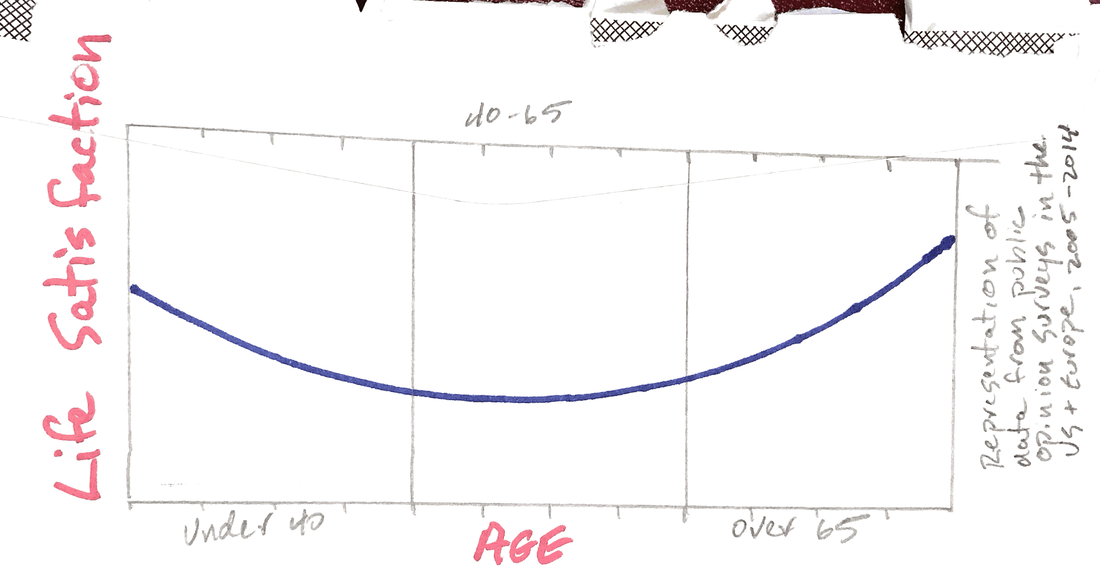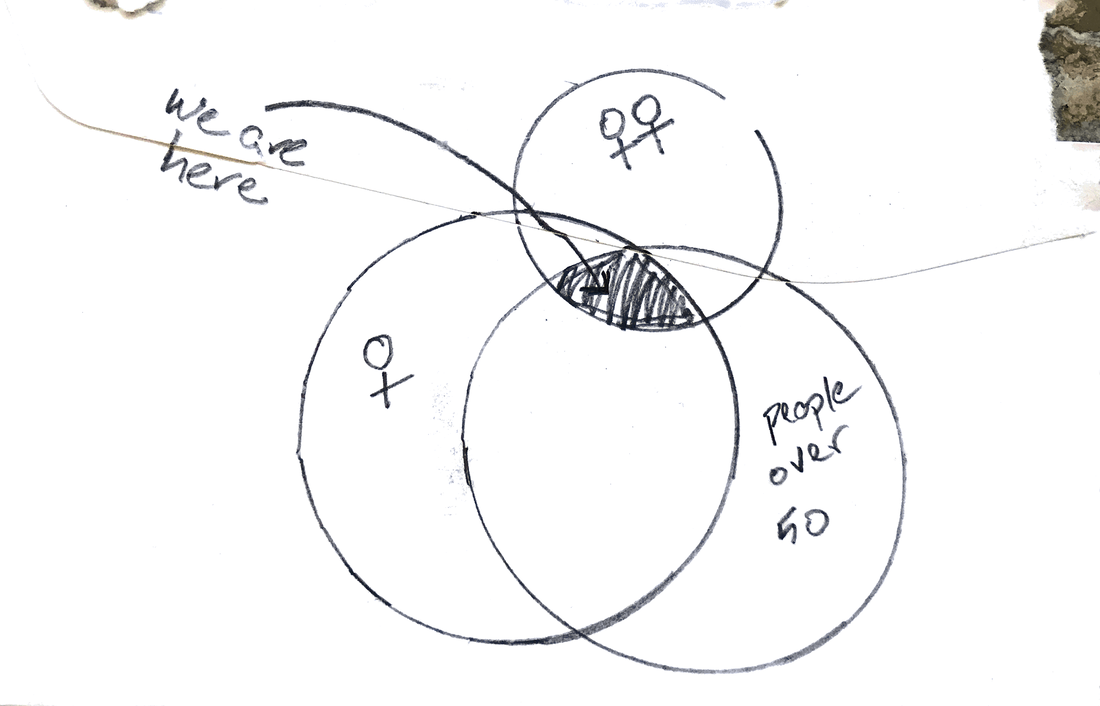|
The third Positive Change for Midlife Lesbians podcast went live yesterday, and the topic is "What if?" As in, what if the thing you are so scared will happen works out okay? Is there a downside to imagining a future for yourself that has a good next chapter?
There are some people out there who had some pretty bad things happen and later reported it as good news. Jim Wright, the speaker of the House of Representatives stepped down amid financial scandal (oh, how times have changed!) later said that it was all for the best. Was he just lying? There's a difference between masking a negative feeling with a platitude and actually feeling and experiencing and moving through it. Pretending to be happy when you aren't is like slapping a happy face sticker on your fuel guage and pretending that you won't run out of gas. But, positive psychology research does tell us that we do have some control over our level of happiness, and that there are actual behaviors you can do to improve your happiness set point. You've probably heard of many of them: Keep a gratitude journal, write letters to people who have had a good impact on your life, have a meditation practice, spend time in nature and around animals, even make your bed! Wanting to feel better is natural. Frankly, it's why we humans develop habits and coping strategies such as overeating, drinking too much, leaning on Netflix, and staring for hours at our phones that lead to negative outcomes and make our problems worse. Toxic posititivity is pretty much what someone else heaps on you. "Cheer up. It can't be that bad." "Look on the bright side." The worst instances are in response to grief and loss, and are clearly a reflection of the toxin-spewer not being able to manage their own feelings about loss. At the risk of sounding toxically positive, they are not evil, just bad at managing their own emotions. But guess what? You really do get to be in charge of what you think about a circumstance. And sometimes you'll think things suck and sometimes think things are good. What you think determines how you feel. And it really is okay to want to feel better, but if you don't take the time to acknowledge and feel your negative feelings, then you are just slapping a happy sticker on the E of your gas guage. In the podcast, I'm suggesting that we consider the possibility that things might not suck in the future. There are definitely examples where finding that possibility is maybe not possible. But if there is reason to believe you have time left on this planet, then there may be a chance that things will turn out okay. Jim Wright probably didn't think so in 1989 when he resigned. He lived almost 30 more years after that fall from grace. Maybe we can imagine that in the balance of our years that everything will work out. If you want some insights from an objective third party, maybe try a free coaching session?
If you a mom, you are somewhere on the journey of transitioning from a care-taker and decision-maker for the health and well-being of your child or children to being an observer of how they live their lives. I remember when my older son announced he hated the family vacation I had planned for us. I'd always made sure that the trips that included the kids were very kid-centric. On this particular vacation, we were staying in a beach town and I'd arranged for my sons to have a surfing lesson. I thought it would be a big hit. I was incorrect. My older son hated everything about it.
It was quite an eye-opener to see my son in a nanosecond go from fun kid to sulky tween who wanted his independence. It felt awful. I was mad at him for not appreciating all the pains we took to plan a nice vacation. I felt guilty that I didn't know him as well as I thought I did. I experienced shame at wanting him to be different than he was. It took me awhile to realize that it was pretty much inevitable that he would at some point morph into his own person with his own preferences. As a young adult now, it's clear that he's not really hard-wired to be super deferential to the feelings of others. The good new there is that I always have a clear picture of where I stand with him. I was in the midst of a converstion with a lesbian mom recently who's son in his 30's was in town but hadn't called. She was mad. She blamed herself for not raising him right. She thought her son was punishing her. She was looking for all the validation that her son was doing her wrong. But was he really? Did my son decide he hated the vacation because he was a bad kid? Of course not. In the middle of it though, I was angry too. So what do we do about people who disappoint us, especially when we've invested so much of ourselves over the years in that relationship? Do we stay mad and just bear it? Cut them out of our lives? Those definitely are options. But do they help us feel better? Consider instead the possibility of examining our expectations. If we can change our thinking about what others should be doing, we can find some ease right where we are. And just maybe in finding some ease in relationshops with others, we can improve our relationships with ourselves as well.
It's true! Now we have a podcast of our own. If Virginia Wolff were here, I'm sure she would approve!
We are a nugget of a Venn diagram we share with all women, people over 50 and lesbians. Some things that apply to all women apply to us. And we likely share some issues with all people over 50. And we definitely share many issues with lesbians of all ages.
But, we are our own nugget of specialness within the diagram. We have our own unique needs, concerns and issues. In many ways, we may feel even more invisible than we did before and all we did to get here is have the audacity to celebrate more than 49 birthdays.
So, this podcast is for us. It's not the Michigan Women's Music Festival, but still, it's for us. Here’s the first episode, and it focuses on what no one told us. Have a listen. Leave a comment. It’s time to lift up our collective nuggets of awesomeness. Let’s go!  If we were having coffee together, I'd have drawn this on a napkin If we were having coffee together, I'd have drawn this on a napkin First the good news – midlife crisis isn’t really a thing. Yes, you might be unhappy. Is this feeling inevitable and everyone goes through it? Nope. But, there is a documented U-shaped curve of happiness and well-being, evidence across many cultures that we humans on average have a slump in our level of happiness when we are in our 50’s. Since we as a culture understand the gist of the term “midlife crisis”, it’s a phrase I use to reflect a collection of feelings of hopeless, under-fulfillment, and restlessness. Maybe it's feeling like you’re on the glideslope to the end and your best years are over. A midlife crisis usually affects one’s self-confidence or identity. There may be a significant amount of regret over how you’ve lived your life and an intense desire to correct it as soon as possible. There is often a precipitating event that causes the sufferer to examine their life from a new perspective. Not everyone goes through this, but a lot of us do. If you find yourself in the middle of one, your main concern is trying to feel better, and we often do that by changing our circumstances in big and little ways. Stereotypically, a midlife crisis is thought of as a man’s thing – red sports car, leaving the wife for the secretary, job change, hair replacement, gym membership. We all know or know of that guy. We lesbians may find ourselves doing some of those things, but midlife is qualitatively different for lesbians. Our experience of the life satisfaction sag in our 50’s may be brought on by life events that never or rarely happen to men: Menopause – which might bring on weight gain (and in new and surprising places!), change in libido (no viagra in sight for us!), Maybe you've come out in your 40s, 50s or 60s, wondering "Now what?" Maybe you find yourself single after decades, after the death of your partner or breakup or divorce, whether welcomed or not. If you always thought maybe you'd have kids, your options look a lot different now. Or maybe you do have kids and you find yourself the oldest person at back-to-school night and, no, "I'm not his grandmother, I'm his other mother." Or maybe you are now discovering what that whole empty nest thing is all about. And, as women, lesbian or not, we are more likely to be the ones to care for our aging parents (or our partner's aging parents) than our brothers are. Often, more than one of these big life events is happening at the same time, and navigating the change in life roles can heap the unhappy on you in big piles. As you can see from the graph, you can probably wait it out. The good news is, you can feel better sooner. The next post will offer some tangible steps you can take immediately. If you want to get started now, click here to sign up for a free 30-minute no-strings call with me. |
Archives
January 2024
|





 RSS Feed
RSS Feed
